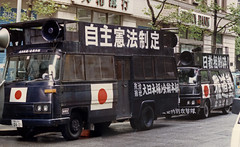Jordan Sand’s A Year of Memory Politics in East Asia: Looking Back on the “Open Letter in Support of Historians in Japan” is immensely timely: I spent a few hours just yesterday arguing with people on twitter about the Comfort Women issue. I had tweeted about a new documentary, testimony from some surviving women, and got … well, the usual pushback, using the usual arguments.
The film is called “The Apology” by Tiffany Hsiung of Canada and it sounds fascinating.
The Apology follows the personal journeys of three former “comfort women” who were among the 200,000 girls and young women kidnapped and forced into military sexual slavery by the Imperial Japanese Army during World War II. Some 70 years after their imprisonment in so-called “comfort stations,” the three “grandmothers”– Grandma Gil in South Korea, Grandma Cao in China, and Grandma Adela in the Philippines – face their twilight years in fading health. After decades of living in silence and shame about their past, they know that time is running out to give a first-hand account of the truth and ensure that this horrific chapter of history is not forgotten. Whether they are seeking a formal apology from the Japanese government or summoning the courage to finally share their secret with loved ones, their resolve moves them forward as they seize this last chance to set future generations on a course for reconciliation, healing, and justice.
Jordan Sand writes, regarding the counterattacks on the Historians’ Statement (of which I was a signatory, as was my colleague Alan Baumler) “With regard to the comfort women issue, the Japanese right continues, on the one hand, to be highly selective in its use of evidence, and on the other hand to treat any criticism of wartime Japan as a personal insult. … a defensive nationalist bias that privileges the state and seeks to minimize the suffering of its victims has no place in either the historical profession or the classroom.” This was very much in evidence in the twitter discussion: “we Japanese” and “testimony alone is not evidence” and “objective proof” and “identified incidents.”
What finally put an end to the discussion, aside from exhaustion, I suppose, was asking the anonymous/pseudonymous tweeters … why it matters so much? “I don’t understand what dire consequence results from the Japanese state apologizing for what you’ve already admitted happened.”
In fairness, I do know why it matters, or at least there are a number of fairly obvious reasons. Jordan Sand discusses quite clearly the implications of ‘mainstreaming’ Japan’s wartime experience:
If you believe, as many Japanese conservatives do, that Japan at the time was engaged in a necessary war of national defense, then it will be easier to accept the view that the comfort station system was simply an unfortunate by-product of war, and that reports of abduction and rape by the Japanese military are either false or rare aberrations.
…
Similarly, since many Japanese conservatives believe wartime Japan was not abnormal, and in their view a “normal country” (with the United States often providing the implicit model) is one for which citizens are prepared to give their lives, it becomes natural from this perspective to treat all Japanese deaths in the Asia-Pacific War as noble sacrifices. In this context, the wartime slogan “suppress the individual, serve the state” (messhi hōkō) becomes simply an expression of national duty, rather than of an ultranationalism that abrogated private rights and ultimately led to forced mass suicides.
 As I’ve suggested before, I think that the historical denialism and conservative revisionism that we have seen in Japan is part of a larger right-wing turn in East Asian and global affairs (obviously, my previous list can easily be updated with reference to rising European right-wing parties, the dramatic turn of the US Republican party and historical revisionism aimed at the Civil War, Putin, etc.). Jordan Sand points out that his students read the Japanese historical revisionist manifesto positively, believing that nations have a right to a positive self-understanding. I see in my own students the same conflations that attacked me on twitter: the conflation of state and nation and self, the conflation of useful and positive and true history, the difficulty of changing minds with even the best evidence….
As I’ve suggested before, I think that the historical denialism and conservative revisionism that we have seen in Japan is part of a larger right-wing turn in East Asian and global affairs (obviously, my previous list can easily be updated with reference to rising European right-wing parties, the dramatic turn of the US Republican party and historical revisionism aimed at the Civil War, Putin, etc.). Jordan Sand points out that his students read the Japanese historical revisionist manifesto positively, believing that nations have a right to a positive self-understanding. I see in my own students the same conflations that attacked me on twitter: the conflation of state and nation and self, the conflation of useful and positive and true history, the difficulty of changing minds with even the best evidence….
Well, I have to grade now, and it’s not like I’m going to solve this problem anytime soon. It does sound, though, like Hsiung’s “The Apology” is a film well worth seeing and sharing, and I hope it does get good distribution.
Thanks for posting.